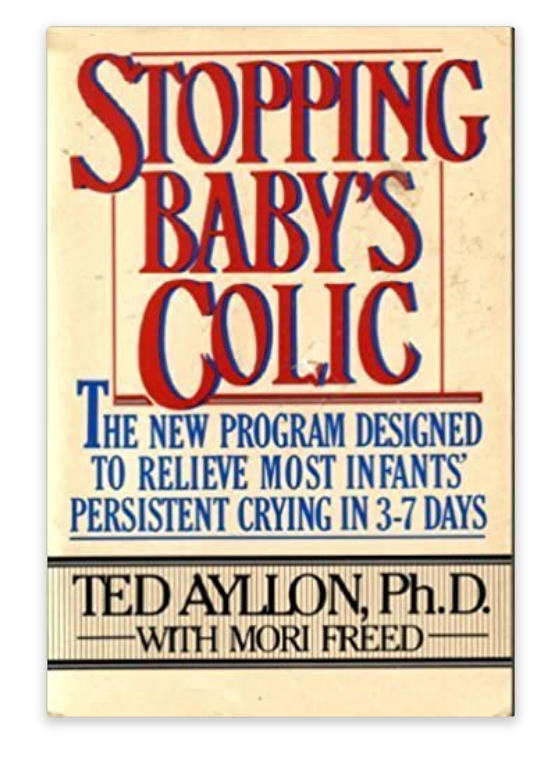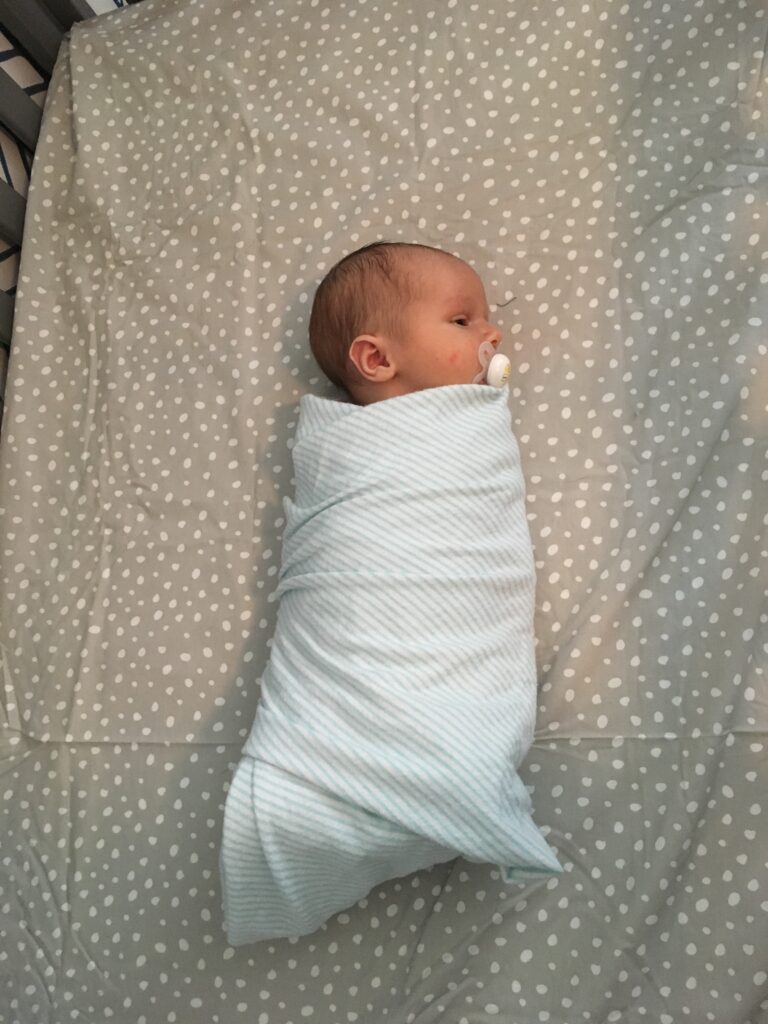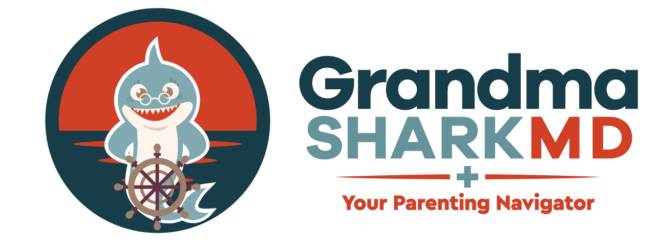
What is a “colicky baby” and what its NOT
When I first encountered “Infant Colic” in my second child at 6 weeks of age I realized that my professional training in Pediatric Medicine had not even prepared me to diagnose, evaluate or treat this common ailment. What my profession knew was how to define it. How to reassure parents that it would go away. How to give parents something to do in order to cope with it. Finally, what studies had been done on the gastrointestinal system to show that it wasn’t due to the gastrointestinal system. None of this helped me to “cure” my baby girl’s colic but “sleep training”, though it wasn’t called that at the time, did.
Is my baby “Colicky”?:
The classic “old school” definition at the time I was searching for answers to my baby girl’s colic (1990) was an infant that cries for more than 2 hours total per day and seems difficult console despite feeding well, growing well and with no other signs or symptoms of illness or disease. To note, the crying tends to be in the evening hours between 6pm – midnight but it can worsen to include morning and afternoon hours. Now, in reality 2 hours is a lot of time and when studies were done with parents accurately logging babies crying spells they actually had overestimated the time of crying by an average of 100%. This tendency to overestimate the time of crying was found to be consistent even when children were older. Ever been on an airplane with a crying baby or toddler? You know it seems like that kid will never shut-up. Be honest with yourself! The truth will set you free.
So that was the definition then, and now the definition is 3 hours! Really!? What a copout Pediatric Medicine…just make the time longer so that you don’t have to deal with this pesky problem that occurs in 20% of your patients and MORE in the children of your affluent and better educated families…why is that?
Gas does not cause colic:
It’s not gas. Babies who cry more may swallow more air and pass more gas but gas does not cause pain. Go ahead fart now. I’ll wait. Did that hurt?
It’s not gastrointestinal reflux (spitting up which occurs regularly in 50% of all healthy babies). As much as Johnson and Johnson and every other Pharmaceutical Company and Infant Formula Company would like you to think , it is not reflux.
It’s not that your baby is just overly sensitive to stimulation and cannot self-console due to an immature nervous system. Way to blame it on the baby! All babies have an immature nervous system, they’re babies! Haven’t you ever heard of the expression that when someone is yelling, demanding, crying and in general acting immature that they’re “acting like a baby”? Maybe they are not overly sensitive to stimulation, but they are being overly stimulated. This what I and other caregivers of my baby girl were unwittingly guilty of.
Now in 2021 thanks to the Multibillion Dollar Health Food and Diet Industry the following are also being sold as the cause of Colic:
Food Allergies/sensitivities to what the breastfeeding mother is ingesting
Milk Protein Allergies to the formula
Its as if you didn’t have enough to worry about with sleepless nights and cracked nipples that these “solutions” are telling you, you can’t eat chocolate cake. Go ahead and eat whatever you want that won’t alter you mental status (drugs or alcohol) and have it negatively effect your ability to parent. The proteins you eat are not being pumped directly into your milk. PERIOD. Your baby is ingesting Human Milk not the Cow’s Milk you drank or Broccoli or Cauliflower, etc. Your baby is not ingesting your gas. So JUST STOP with this insane illogical advice.
Lactose Intolerance (Breast Milk has Lactose in it)
In short IT’S NOT THE GAS.
How I solved my baby’s colic and accidentally learned to sleep train

Okay, so although this book saved my life in 1990 and I have purchased it a minimum of three times in my life only to “lend” to others as many times. I do not suggest that you buy this book because there is an easier way… This book was based on Behavioral Theory as the cure for Colic. The first thing it did was made sure I responded to all my babies needs: 1.Food (as much as she wanted) 2. Warmth but not too much warmth 3. Diapers need changing? 4. Is your baby sick? (Being a Pediatrician, I had this one covered) 5. Sleep.
That last one, Sleep..that is the one that I was missing the clues for.
SLEEP IS BRAIN FOOD
You wouldn’t starve your baby would you? Of course not! You love your baby. You want to be the best parent, caregiver, grandparent in the Universe. Do I get an Amen!? So don’t starve your baby of brain food either. Babies who aren’t getting enough sleep are not integrating all the information they are taking in while awake. The Neuroscience and Neurodevelopment evidence is in and I will blog about that later but trust me for now: SLEEP IS BRAIN FOOD. And babies who aren’t getting enough brain food are crying more because of it. They are crying because they aren’t learning how to fall asleep. They are crying because they aren’t getting enough sleep. They are crying because they are not getting good quality sleep and their little brains are starving.
Okay, that was dramatic, but it is just as dramatic as the hate mail I’ll get from self important defenders of all that is disempowering to parents who say that “sleep training promotes abandonment and goes against Dr. Sears “Attachment Parenting Theory”. News flash I DID NOT SAY DO NOT ATTEND TO YOUR BABY’S CRYING, I said that one of the reasons that your baby is crying is that they are tired and need sleep. It’s their little brains saying FEED ME! I will blog in another post about Infant Attachment what it is and What Its NOT. It is definitely important and if you are even reading this blog YOU are definitely already doing it as a parent. So take a deep breath and tell that inner critic to shut the f*#ck up.
If you can’t wait for me to blog about the safety of sleep training to your babies mental, emotional and physical health or what is erroneously called the Cry It Out method then I highly suggest you read:
Crib Sheet by Emily Oster: Cribsheet: A Data-Driven Guide to Better, More Relaxed Parenting, from Birth to Preschool (The ParentData Series)
and
It’s Never Too Late to Sleep Train: The Low-Stress Way to High-Quality Sleep for Babies, Kids, and Parents by Dr. Craig Canapari the director of the Yale Pediatric Sleep Center
We All “Sleep Train” Our Babies From Day One
Read that again: we all sleep train our babies from day one. In the first few days of life after birth babies often need to be woken up and encouraged to breast feed so that mother’s breasts are stimulated to produce milk. Bottle fed babies are offered formula at least every 2-3 hours. I highly encourage breast feeding but there is no judgement or harm to your baby if you chose to bottle feed. I will say this, if you are breast feeding and your baby is colicky IT IS NOT THE BREAST MILK, don’t listen to anyone (including a Pediatrician) who tells you this. See “What Colic Is Not” above.
Why do we need to wake babies up at this early stage? Because babies have been getting their nutrition in utero from the umbilical cord and now they need to experience hunger which occurs when their blood glucose drops and cry and root for a nipple to sustain them. All mammalian babies are born with innate reflexes which help them to do this. Homo Sapiens are of the Class Mammalia: a group of animals characterized by the presence of mammary glands which in females produce milk for feeding their young. We also share with other mammals, the presence of a neocortex (a region of the brain), fur or hair, and three middle ear bones.

So how are we “sleep training” from day one?
Well, once feeding is established we create associations with falling asleep such as always having the breast in the mouth when we fall asleep, always being rocked to sleep, always being in someone’s arms when we fall asleep. And for the first 2-3 weeks this works well. Your baby is a deep sleeper and unless they are being awakened too frequently: changing their outfits too much (guilty as charged in my case), changing their diapers too much, passing them around from one family member to another, or if they have a medical condition requiring a long hospital stay, they will naturally sleep the required (brain food) amount of time (17-20 hours in 24 hours) After these first few glorious weeks of sleep, sleep, sleep, they start to have longer wake windows. Your baby’s sleep also changes and they develop periods of time where they are partially awake but haven’t had enough sleep yet. This usually occurs about 15 minutes into the sleep cycle which isn’t really enough sleep to produce the brain food they need. So, they should naturally fall back asleep right? Here is where the sleep training comes in because if you have trained your baby to always fall asleep in your arms, being rocked with a breast or bottle in their mouth and those things are not present they will wake up fully and cry. If they cry just a little and you restrain yourself from picking them up but actually just reassure them: put the pacifier back in their mouth if you are using one, gently rock the bassinet, provide them with white noise or shhhh’s, they will often fall back asleep and continue on their merry little sleep cycle way. But if you pick them up and they are fully awake and haven’t had their brain food yet they may be difficult to console: crying, arching their backs, refusing the nipple or bottle. This will leave you as a parent feeling like a failure, creating anxiety in you, which your baby will pick up on too. In short they will become a Colicky Baby. Now this doesn’t happen with just one episode of interrupted sleep cycle. Babies form habits just like all of us.
So how do we sleep train from day one? Try this simple technique: when your baby is showing signs of sleepiness or even if they have already fallen asleep put them down drowsy but not asleep in the place you want them to sleep: their bassinet, or crib. If they have already fallen asleep you may have to wake them up a little bit. This way they associate falling asleep with the sleep environment you have put them in and as they go through the sleep cycle and have that period of partial awakening in 15 minutes they are easily able to fall back to sleep into the deeper, restorative sleep that they need.
Now here is where the whole cry it out controversy comes from. Because if you having unwittingly (its not your fault) trained your baby to need these other associations and they have become Colicky because they are not getting enough sleep you may have to go through a period of them crying themselves to sleep as you re-train them to fall asleep in their crib, bassinet or cot. This process is difficult and requires the support from everyone in your home. I’d highly recommend a sleep training coach, yes even if you are co-sleeping, because they will help you through this process in a safe and supported way.
Why does this even matter?
Well besides the negative effects on Neurodevelopment which occur when babies don’t get enough Brain Food there are the negative effects that Colicky Crying has on bonding with your baby. That’s right, babies who are NOT Colicky, who’s parents are getting enough sleep (parents need brain food too) are better able to bond with their caregivers. Non-colicky babies have more time of awake, calm and interactive behavior. Parents are feeling more calm and confident that they are successfully providing for their infants needs. I’ll talk about this in a future blog when I talk about what healthy Attachment is and what its NOT. Suffice it to say that “curing” Infant Colic can be a LIFE SAVING change especially in the lives of babies whose parents are not being supported due to their social and/or economic situations. And I have the data and experience collected over 30+ years as a Pediatric Trauma Specialist and a Forensic Child Abuse/Neglect expert to prove this. So stay tuned for my next blog on that.
With Gratitude for all of you who are raising the next generation of amazing kids,
Julia A LaJoie, MD AKA GrandmaSharkMD

I really liked your site. Thanks for the information. 30136296